Climate change is currently one of the greatest threats to global well-being. Rising temperatures, unpredictable floods, long droughts, or the rising of sea levels are some of the consequences of this environmental process that increasingly diminishes the quality of life of all living beings, threatening health, food security and diversity.
In this context, the importance of accurate weather forecasting becomes a priority to mitigate and predict the effects of these phenomena. In fact, the market for weather forecasting systems is expected to grow to $3.5 billion by 2026, demonstrating the huge demand for weather information today. Fortunately, however, the weather forecasting landscape is undergoing a sea change catalyzed by an unrelenting need for weather innovation.
Traditional barriers such as the sheer volume of survey equipment or the need for complex meteorological data are becoming surmountable challenges, giving way to a new system of methods and techniques that have brought a wave of improvement to the sector. In this blog post, we will go through new techniques that are revolutionizing the sector and some of the most innovative companies that are bringing new tech in field.
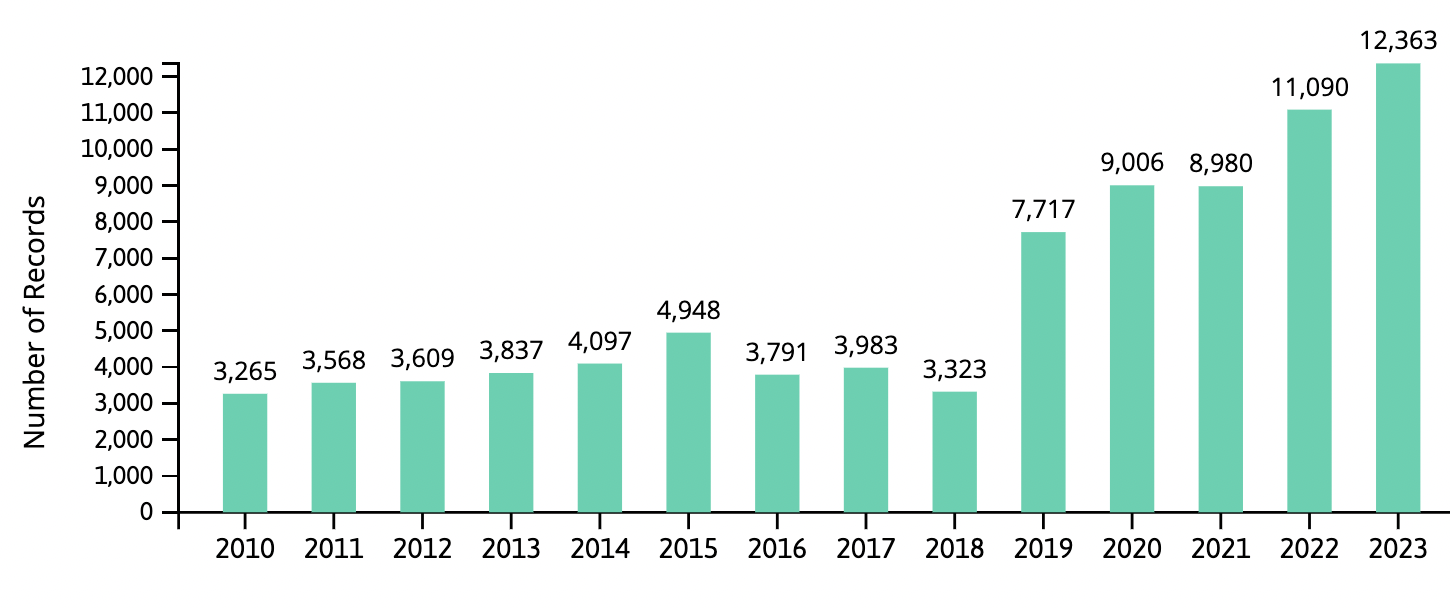
Innovation in meteorology, Records by year. Source: Linknovate
TECHNIQUES REVOLUTIONIZING METEOROLOGY
Weather forecasting has undergone a remarkable evolution from relying solely on human observations to integrating advanced technologies. Modern weather stations have become highly sophisticated, taking advantage of rapid technological progress to collect and analyze data more effectively. One of the most significant advances has been the development of state-of-the-art sensors, which allow meteorologists to monitor air quality, pollution levels and greenhouse gas concentrations in detail, thereby improving the accuracy of forecasts.
The integration of artificial intelligence (AI) has set a milestone in the predictive accuracy of meteorology. Thanks to advanced algorithms, meteorologists can analyze large volumes of data and decipher complex weather patterns with unprecedented accuracy. AI-powered weather stations promise to adapt to changing weather dynamics, strengthening communities’ ability to cope more effectively with extreme events.
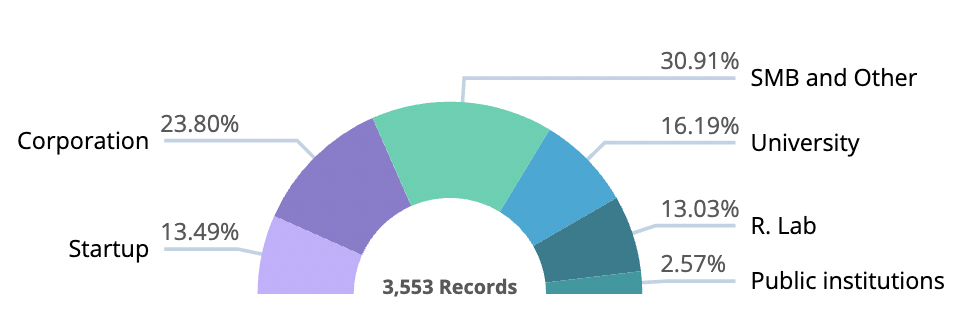
Type of organisations leading R&D in AI-led meteorological tech. Source: Linknovate
In addition, the proliferation of the Internet of Things (IoT) has significantly expanded weather monitoring capabilities by enabling real-time data transmission and the deployment of connected weather stations in remote locations. Mobile stations have also contributed to progress, providing flexibility for meteorologists to obtain real-time data from inaccessible terrain. These advances, supported by cloud computing, have transformed the way weather data is stored, analyzed and used, fostering community collaboration and enriching weather prediction models.
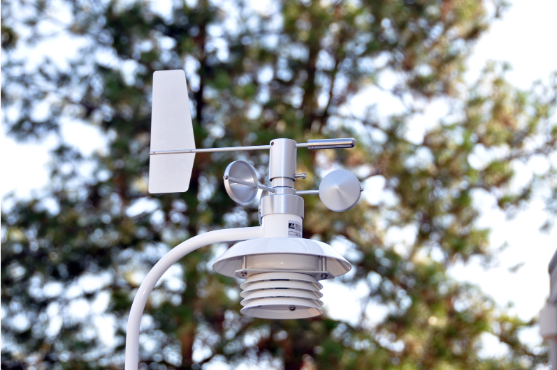
Weather sensor. Source: Met One Instruments
STARTUPS YOU NEED TO KNOW ABOUT
In this context of innovation and transformation, there are several startups that are taking advantage of these techniques to completely revolutionize meteorology, bringing to market products that enable everything from rapid and effective weather monitoring to the use of public data to model the progress of climate change.
Skydweller
Skydweller Aero is a US-Spanish company that has pushed the boundaries of innovation by introducing the first autonomous solar-powered flight. This pioneering achievement, carried out without any human intervention, took off from Stennis International Airport in the United States, marking a monumental milestone in autonomous aviation and environmental stewardship. But Skydweller’s vision is not limited to flight: its revolutionary technology opens new perspectives in surveillance, environmental and climate monitoring, and communications. With the ability to stay aloft for 90 days or more at altitudes of up to 45,000 feet (about 13.72 km), Skydweller aircraft offer an unrivalled solution to continuously cover areas of interest, from conflict zones to maritime borders, without endangering human lives and collecting valuable data on the state of the atmosphere, temperatures, and humidity.
Beyond its prowess on that first mission, Skydweller’s solar-powered aircraft represent an environmentally friendly and cost-effective alternative to conventional flight. By consolidating missions that would previously require multiple aircraft and crews, Skydweller not only dramatically reduces operating costs, but also significantly minimizes environmental impact.
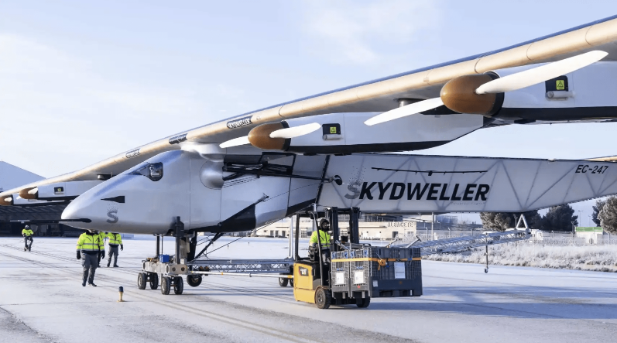
Solar-powered aircraft presented by Skydweller. Source: Skydweller
Whiffle
Whiffle is revolutionizing the field of meteorology by providing hyper-local-scale weather forecasts and simulations with unparalleled accuracy. Its model uses superior computing power to solve weather complexities with unparalleled accuracy, employing large vortex simulation (LES) to deliver reliable, customized forecasts and simulations for a variety of industries. With its web application, Whiffle Wind unlocks the power of Whiffle’s LES-driven weather modelling technology, allowing users to master complex wind flow dynamics such as wakes and turbulence, all through an extremely user-friendly interface.
For efficient renewable energy development and operations, Whiffle’s ultra-high resolution atmospheric model offers benefits for energy production forecasts and wind resource assessments. With Whiffle’s accurate forecasts, companies can proactively plan for adverse weather events, minimizing outages and protecting assets. In addition, by improving the match between electricity supply and demand, utilities can avoid imbalance penalties, optimizing costs and system efficiency. This enables more informed decisions on site selection and future energy yields, improving operational performance in renewable energy.
IoTix Lab
IoTixLab, a Bangladeshi startup, is at the forefront of innovation in meteorology with its development of wireless weather stations for meteorology, agriculture and forestry. Its Internet of Things (IoT) device measures temperature, atmospheric pressure, humidity, precipitation, as well as wind speed and direction. In addition, the company designs anemometers and sensors for temperature, pressure and humidity measurements. IoTixLab not only focuses on physical devices, but also develops an online platform for visualization and monitoring, providing a comprehensive solution for meteorological measurements.
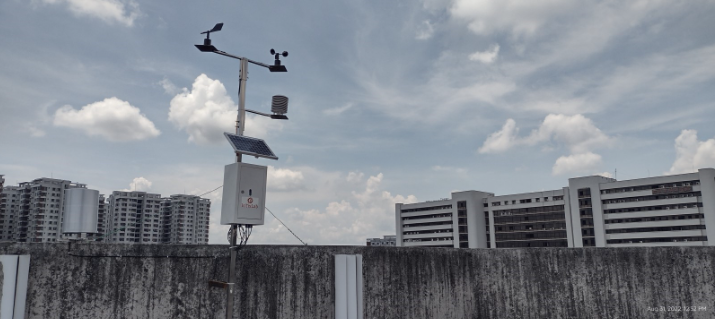
Monitoring station installed by IoTixLab in 2022. Source: IoTixLab
The company focuses on IoT (Internet of Things) based remote monitoring solutions and offers military grade encryption to protect its customers’ valuable data. Its focus on research-driven product development ensures a high level of quality and accuracy in its devices and services. From dataloggers to IoT platforms and analytics software, IoTixLab offers a full range of products for data-driven decision making. With a commitment to quality and innovation, IoTixLab is paving the way for more efficient and accurate weather and environmental monitoring.

Top countries employing IoT in weather tech. Source: Linknovate
AtmosMarine
AtmosMarine is a Brazilian startup specialized in the calibration of atmospheric and oceanographic models for the prediction of extreme weather events, offering a wide range of services including weather and climate forecasts, metoceanographic measurements and specialized agricultural consultancy.. They develop an operational system of hybrid modelling via artificial intelligence, SOPHIA, to forecast environmental parameters. This system enables accurate prediction of weather and extreme events for industries such as agriculture, maritime, renewable and aviation. In addition, AtmosMarine develops oceanographic buoys that enable real-time monitoring of waves and sea temperatures. The company, founded in 2016 by a group of experienced scientists, is committed to providing advanced and rapid solutions for weather monitoring, ship routing and environmental characterization, using the latest models and data visualization solutions available.
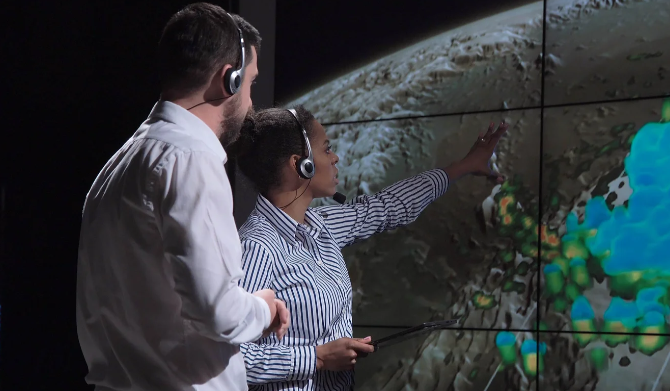
AtmosMarine oceanography experts. Source: AtmosMarine
Weather Measures
Weather Measures, a French startup, stands out as a leader in spatialized meteorology for the agricultural sector. With strong expertise in precision meteorology and the use of artificial intelligence, Weather Measures offers customized weather services for farmers and agronomists. Through field studies, the company identifies its clients’ weather-related objectives, such as data composition, frequency and delivery. In addition to meeting agricultural needs, Weather Measures offers weather risk management for industrial sites and develops warning systems for environmental risk management. The company covers the entire French territory with observations per square kilometer and forecasts on all-weather parameters, from rainfall and temperature to wind, humidity, radiation and soil temperature.
Weather Measures distinguishes itself through its focus on anticipating climate risks in specific areas, such as flood or drought zones. By implementing warnings for communities, energy sites and the tourism sector, they contribute to improving resilience and preparedness for adverse weather events.
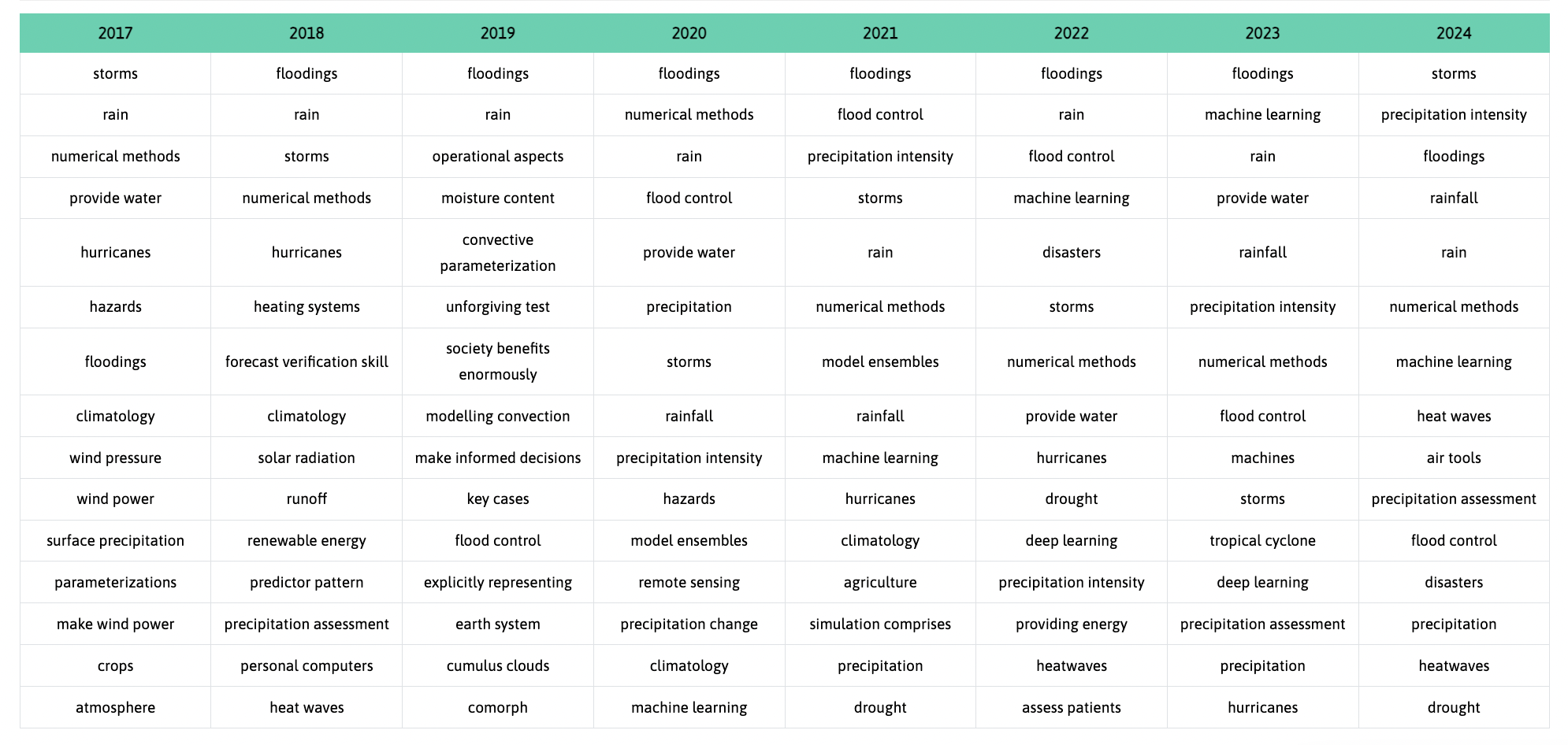
Key words related to weather forecasting for risk management & extreme events, evolution by year. Source: Linknovate
In a world where climate change has become one of the greatest threats to humanity, accurate weather forecasting becomes essential to mitigate its impacts. Through the development of technologies such as artificial intelligence, the Internet of Things and advanced atmospheric models, these companies are transforming the way weather data is managed, paving the way towards a future where weather forecasting is not only a powerful tool, but also a vital necessity for the protection and well-being of the society and the planet.





